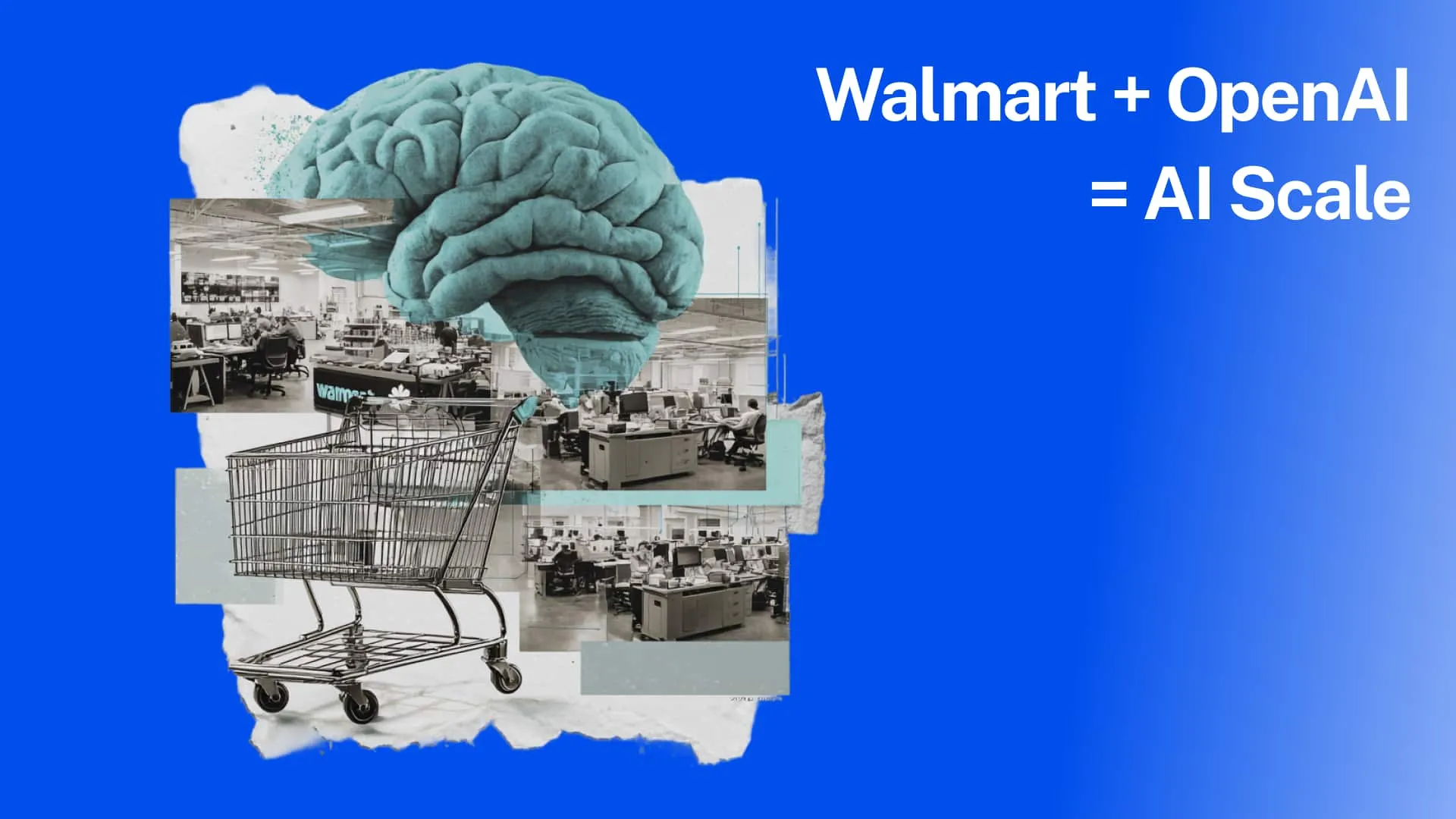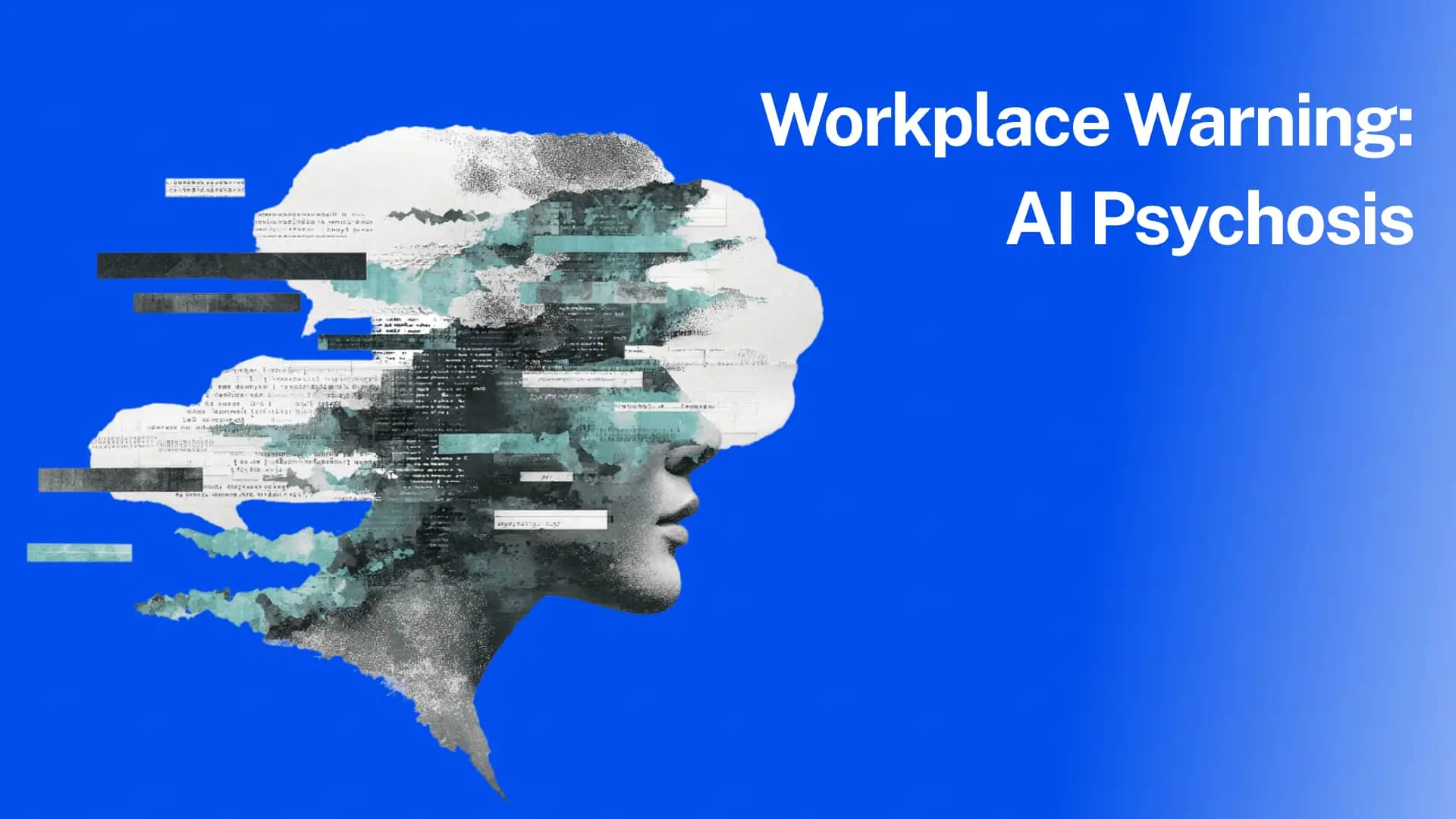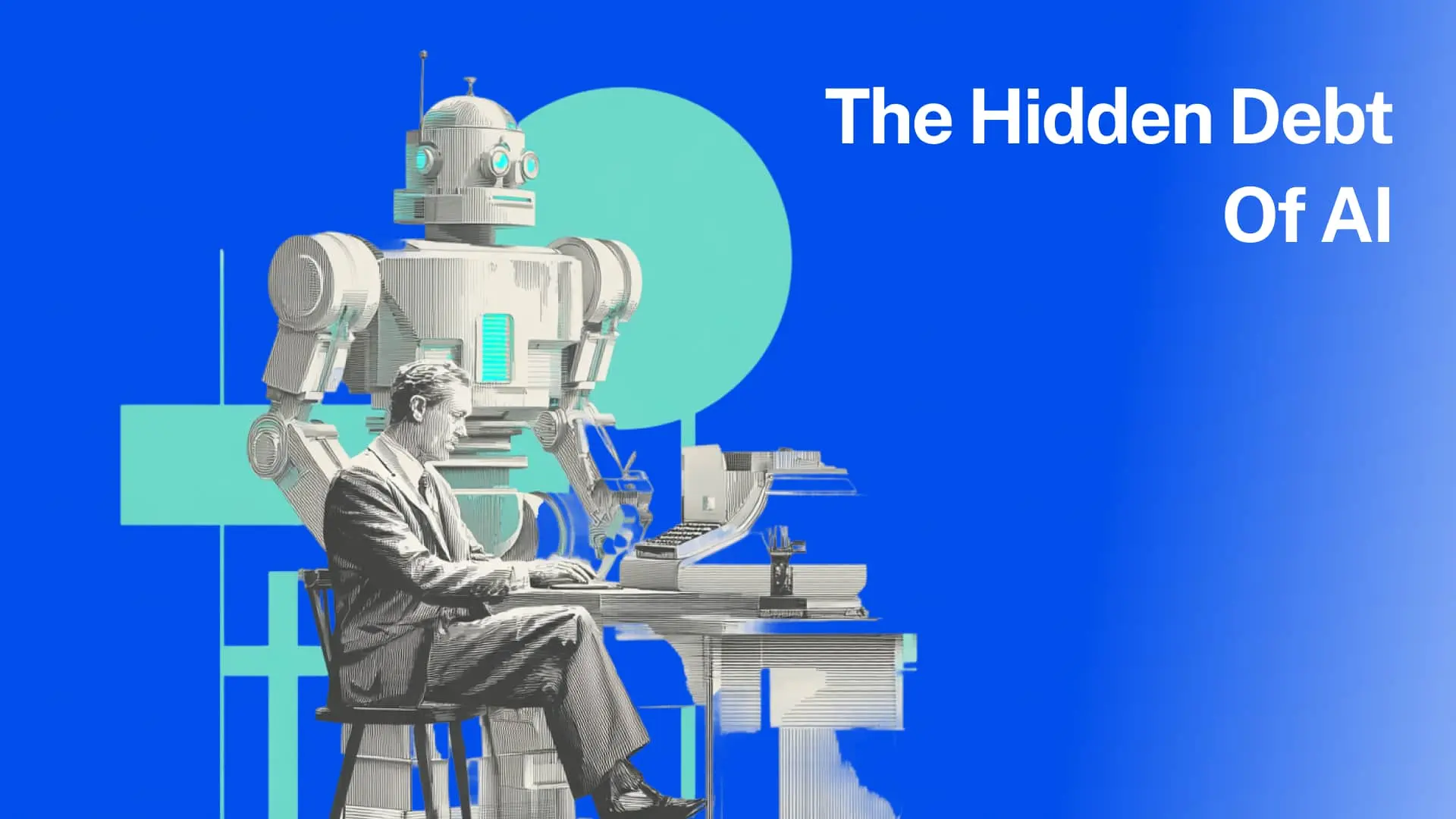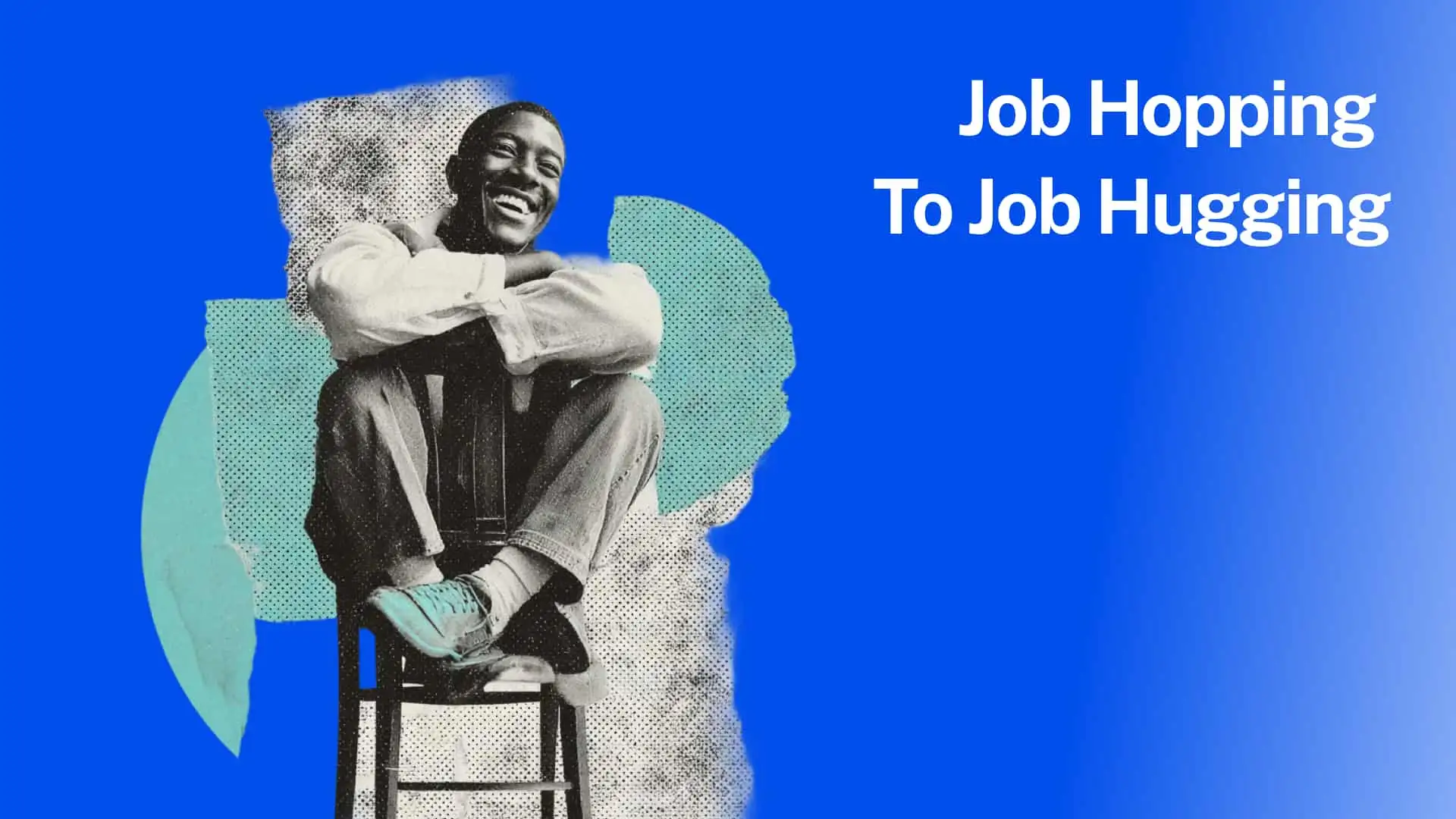In last week's newsletter, I discussed how AI would make us more productive, especially in remote organizations.
Early research shows that employees can be up to 35% more effective, with more significant boosts in specific roles.
This productivity boost leads to the question: how to use AI? How many jobs will AI in the workplace replace? And which jobs are most at risk? That's what we'll dive into this week.
Read on and find out that I'm definitely screwed as a CEO-researcher-writer!
(Note: AI is developing rapidly. Take a look at our six must-know AI trends in 2024.)
How is AI able to replace jobs?
Artificial Intelligence (AI) can perform tasks that typically require human intelligence, like language processing, pattern recognition, and decision-making. With the incredible uptake of ChatGPT, AI is now more widely adopted than ever.

With AI being more accessible and able to do everyday tasks like taking meeting notes, sending emails, and writing documents, work is becoming easier and more efficient. This leads to jobs being automated and becoming redundant.
AutoGPT, an AI that can take action autonomously and 'may surpass ChatGPT' according to Forbes, further increases the amount of work we can offload. Some examples of AutoGPT include:
- Creating an entire website from scratch. It can search the internet for sources and sample code to build a site.
- Maintaining a to-do list that launches another ChatGPT agent to handle the task each time a new job is added.
- Performing market research. GPT can list the top five manufacturers in a specific field and then extract the pros and cons from many reviews.

If that wasn't enough, in another bout of rapid AI innovation, Google presented its AI assistant Bard last week. Bard has full access to the live internet.
This makes Bard, like Microsoft's ChatGPT-powered Bing, even more effective than ChatGPT, which only has access to files until May 2021.
With already-powerful ChatGPT, up-and-coming AutoGPT, and the introduction of AI connected to the live internet, the implications for reductions in the workforce seem apparent.
What percentage of jobs will be replaced by AI?
In a new report, Goldman Sachs found that roughly two-thirds of current jobs are exposed to some degree of AI automation and that generative AI could replace a significant share of their workload (25-50%.)

The analysts who wrote the report predict that AI can lift productivity growth by 1.5 percentage points over ten years, eventually eliminating 18% of jobs globally, the equivalent of 300 million full-time jobs.
These displacements will especially happen in more developed markets, with Hong Kong and Singapore leading in the APAC region.

In recent interviews on This Week in Startup's incredible series on AI, Dropbox's Aaron Levi, Airbnb founder Brian Chesky, and LinkedIn founder all agreed that AI can remove 30% of tasks.
We're already seeing the first signs of companies laying off parts of their teams due to AI like IBM pausing hiring for jobs AI could do.
What kinds of jobs will be displaced by AI?
Based on the Goldman Sachs report, the effects of AI will vary across industries: AI could automate almost half of the administrative and legal tasks but only a small percentage of tasks in the construction and maintenance industries.

So what are some jobs that AI could replace? I've compiled a list with the help of articles from Insider, BBC, the Goldman Sachs report, and of course, ChatGPT.
Coders
AI can displace software developers as ChatGPT can produce code faster than humans, which means fewer employees are needed. Case in point: ChatGPT maker's OpenAI is considering replacing software engineers with AI.
"Our designer is now in charge of our static website – we no longer have our junior web developer. Even for our main project, we've reduced staffing plans. AI also allowed us to renegotiated content freelancer rates," Abhishek Dadoo, founder of micro-access platform for online media fewcents, shared with me.
In a C-suite study on ChatGPT adoption, software engineering leads the pack, with 58% of CEOs saying they require GPT knowledge. This contrasts with 33% in software engineering, 33% in customer service, 32% in HR, 31% in marketing, 28% in data entry, and 23% in sales and finance."

This early adoption of coders is partly due to GitHub co-pilot, an AI-powered coding assistant developed with OpenAI that started gaining traction after its launch in October 2021, a year before ChatGPT was released. The tool helps developers write code more efficiently by providing real-time code suggestions and auto-completions.
Customer service representatives.
Both in chat and voice, AI can quickly find the correct answer to customers' questions.
In a recent study of call-center workers, AI delivered value by analyzing the calls with the highest satisfaction score and working backward to upvote the best answers in real-time and continuously learning. Especially lower-skilled employees saw a boost of up to 35%.
AI can increase efficiency by offering up real-time answers and help customer service representatives handle more calls and resolve customer issues faster. Soon, it will be able to take all first- and second line help desk questions, eliminating the need for some human agents – especially in text chat, which is preferred by younger consumers and employees.
Designers
If you've played with Midjourney or similar tools, you probably anticipate designers to be affected intensely. (Our Design Manager is quickly learning coding skills.)
For Microsoft's Work Trend Index Annual Report, designer Jon Han created the cover art in partnership with Bing Image Creator. Explaining the process, the elements that Jon did himself seem suitable for AI to replace relatively soon.
Fonos co-founder Oscar Jesionek shared about AI during an engaging discussion at SEA Founders Masterclass this weekend. He showed imagery for a recent marketing activity generated by Midjourney. "We simply don't need to use a designer for these tasks, and there's no chance we'll hire one for these tasks in the future," he said.
Game designers are also affected by AI tools like Scenario, whose CEO expects it will cut 20-30% of game studios' staffing needs. The tool allows designers to prompt new design elements in hundreds of variations based on existing intellectual property.
The same goes for photographers. Not just illustrations but incredible photo-realistic pictures are just a Midjourney prompt away. Sounds far-fetched? Take a look at Danny Postma's "This Model Does Not Exist." Because indeed, this model isn't real. In an interview with a16z, Danny describes how building the model costs only 60 cents, after which you can generate 100,000s of photos for under $100.

Product photography isn't safe either, for example with Alfred Lua's Pebblely, which turns product images into marketing assets. With a prompt and a press of the button, one product photo can be placed in tens of shots, removing the need for on-site product photography, and all the manpower needed for those.
Writers
Most likely the obvious one in this list, professional writers will be heavily affected. ChatGPT and related tools make writing well a breeze. Economist Paul Krugman shared in The New York Times that AI-powered assistants like ChatGPT can perform writing more efficiently than humans.
As a result, the media industry is experimenting with AI-generated content. CNET used AI to author multiple articles but had to issue several corrections. BuzzFeed also utilizes ChatGPT's technology to create new forms of content, such as quizzes and travel guides.
While we may see a rise in "Quiet Luxury Language," GPT content will do for the masses.
Sybil founder Theo Sanders posted about a new GPT-powered bot the team developed to write marketing copy. "It's not perfect, but it's been far better than vanilla GPT," he said before sharing that the company cut their spending on copywriters already had decreased by 50%.
DesignPro's Mohammed Abdoolcarim shared: "Writing clearly and concisely has never been more important for founders for writing emails to sales leads, our website value proposition and presentations. I am using AI to help me write clearly and concisely which has allowed me to replace having a copywriter on my team."
One of my favorite tools is the recently launched GrammarlyGO. With GrammarlyGO, you get recommendations for writing and rewriting your emails, Slack messages, presentation, essays, and anything else that needs editing or improvement.
Marketing and PR Specialists
PR specialists can expect similar disruptions. PR Newswire shared that PR professionals carry out routine tasks that AI can take over, "such as developing the framework for a press release, announcement or catalog/e-commerce copy; incorporating SEO keywords into content; generating lists of media outlets and journalists to target; and even predicting pitching success."
For websites, there is UIzard, which with a few prompts or even a reference, can build entire websites for you. Within one minute and with a few simple inputs, a new website, including all copywriting and images, is ready to be edited. Explore more useful tips with our AI Marketing Tools.
Videographers
AI is already being used to automate tasks once done by videographers, such as color grading and scene analysis. This automation could lead to job losses for videographers, as companies no longer need to hire as many people to do these tasks.
Runway CEO Cristóbal Valenzuela demoed how AI can create entire movie scenes. By describing what you want to make, the engine produces a photorealistic video shot indistinguishable from what you'd expect in a typical movie.
Coca-Cola's "Masterpiece" shows the journey of a Coca-Cola bottle from one famous painting to another until it reaches a student who needs inspiration. The ad combines live-action shots, digital effects, and AI technology from Stable Diffusion.
Lawyers, paralegals, and legal assistants
Many working at law firms, particularly first-year graduates, often perform routine and repetitive tasks like legal research, document review, and contract analysis. AI technologies can easily perform these tasks faster and more accurately than humans.
For example, AI-powered legal research tools can quickly analyze vast amounts of data and provide relevant information for a case. Similarly, AI can review contracts and identify potential issues or inconsistencies that a human lawyer may have missed.
One example I loved was an AI-powered "robot lawyer," which offered real-time advice to a defendant in a traffic violation case (a frequent type of case in which the defense is often a template response.) The robot lawyer was supposed to guide what to say, how to plead, and what evidence to provide.
(Unfortunately, its creator DoNotPay had to abandon its plans after receiving threats from State Bar prosecutors, who claimed that DoNotPay's activities constituted the unauthorized practice of law, which could lead to legal charges and potentially even jail time.
Market research and data analysts
Analysts collect data, analyze trends, and use the insights to develop effective investments, campaigns, and strategies. AI can automate these tasks. Like new lawyers, at an investment bank, new hires typically spend several years doing Excel modeling, which AI can now do.
Where previously middle managers or executives had to brief a data analyst to pull up insights from massive amounts of data, they'll now be able to dive into the tools themselves, get the information right away, demand charts, and iterate rapidly.
Example: OpenAI recently released Code Interpreter, which allows you to interact with data and create and adapt charts in real-time. In the short video below, you can see how briefings to a BI or Data Science team become prompts to the AI.
Another startup, ChatPDF, allows you to upload any PDF and ask questions about it. It anticipates questions you may want to ask and offers them to you for even quicker access to what you are looking for.
Trainers and L&D Managers
AI can personalize learning by providing students with content and instruction tailored to their needs, removing the need for trainers. AI can do this by tracking student progress, identifying areas of weakness, and recommending resources to help students improve.
AI will impact Learning and Development Managers as well. Generative AI tools can automatically build content, assessments, teaching guides, rubrics, videos, and simulations in seconds. HR thought leader Josh Bersin warned, "L&D teams going to have to swim upstream in a big hurry."
"The worldwide spending on corporate learning is around $320 Billion, and this is a nearly recession-proof market always looking for new ideas. Every onboarding, sales training, leadership development, and compliance program needs new tools and delivery systems, so there's lots of opportunity for innovation." – Josh Bersin.
Paypal and LinkedIn founder Reid Hoffman built on that by saying that if AI "is this good at replacing your job, it will be even better at retraining you for another job." That instills some hope.
Translators
Google last week demoed a video translator which takes any video and creates a new version of it in another language. Not just dubbing the content but making the lips of the speaker move to the new audio. This replaces multiple jobs typically present for this kind of work.

YouTuber Mr. Beast employed a team to dub all his content in several languages but recently joined a YouTube pilot in which content is dubbed in real-time by the platform. He said "the whole process was a lot more work" before the pilot and that the new technology "supercharged the heck out of those videos and added a lot of views per video for us."
SDRs and other Sales Roles
AI has a proven impact on sales teams: while only 37% of all sales organizations use AI, more than half of high-performing sales organizations leverage AI.
Over 60% of a Sales Development Representative (SDR)'s role is doing manual, administrative tasks, often updating CRM systems and similar. AI can take over these manual tasks, analyze CRM data, make suggestions, and even reach out and reply to people automatically.
To make this happen, Microsoft launched Viva Sales, which drafts tailored customer emails, retrieves insights about customers and prospects, and generates recommendations and reminders. Salesforce created a similar tool called Einstein GPT.
Secretaries and assistants
AI technology can perform tasks commonly associated with secretarial work, such as note-taking, sending reminders, and arranging schedules. Needless to say, AI can easily take this over.
No surprise, then, that many of the platforms seeing wide adoption, like MeetGeek and Fireflies, do precisely this. Similarly, Microsoft Co-Pilot and Google's AI-powered suite of tools give everyone the personal assistant they always dreamt of.
Another great example is Box AI, which allows you to ask the bot to summarize a document of up to hundreds of pages, highlight key points, and then draft an email based on the content, amongst other things.
Voice-Over Artists
Did you see this one coming? As reported by NewsChannelAsia, voice-over artists interviewed for the article say their business has declined significantly in the past six months.
DeepZen offers rates at 25% of the cost of producing an audiobook, with other narration agencies following suit. Apple already announced that it would move to AI-narrated audiobooks, which it said would make the "creation of audiobooks more accessible to all."
(Seeing what this could mean for their business model, book narration app Blinkist quickly sold to Go1.)
Financial Advisors
AI will impact jobs in personal finance that involve handling large amounts of numerical data, such as market research analysts, financial analysts, and personal financial advisors.
It can identify market trends, evaluate the performance of investments in a portfolio, and forecast a better investment mix by utilizing various forms of data provided by financial companies.
Project Managers
Gartner predicts that by 2030, 80% of project management tasks will be run by AI. This is good news as of $48 trillion invested in projects yearly, 65% fail.
AI can eliminate many manual, repetitive tasks in setting up, monitoring, and completing projects common in project management.
Harvard Business Review reports that "We currently think of cross-functional project teams as a group of individuals, but we may soon think of them as a group of humans and robots."
CEOs?
Not even CEOS are safe from AI.
NetDragon Websoft, a Chinese online gaming and mobile company, appointed an AI as the CEO. Named 'Ms. Tang Yu, this appointment marks the first time in human history that a company put an AI in the CEO role.
Tang Yu leads the company's organizational and efficiency department and oversees operations valued at almost $10 billion. Since her appointment, stock performance has increased significantly, marking the end for human CEOs. (But who wants that job anyway.)
AI could drive down wages.
Dr. Carl Benedikt Frey, an economist at Oxford University, thinks platforms like ChatGPT can help writers produce essays and articles. While this could create more competition among journalists, it might also lower wages.
"In my view, it's less about automation. It's more about democratization and competition, potentially leading to lower wages for people in some of these professions," he said. "It's similar to how GPS technology and services like Uber made it so drivers didn't need to know London streets as well, leading to lower wages."
Sinead Bovell, a futurist and the founder of WAYE, is thinking along the same lines. In the a16z podcast mentioned above, she says that "if you look at the history of technology, it is often quite deflationary when it comes to wages. In a world where a model can be in multiple places at once, we could see downwards pressure on prices because assets are created digitally."
Downsizing or more firepower?
Given that AI can level up junior employees and people can do more in less time, the question is whether companies should downsize or add more firepower in the form of highly AI-capable employees.
Individuals can now complete complex tasks that were once only possible by experts in fields such as data analysis, design, and writing.
By eliminating the middleman, teams can operate more efficiently with fewer AI-powered employees producing the same quality and quantity of work.
As a result, according to a new Resume Builder survey reported by HR Brew, 90% of companies want workers with "ChatGPT experience." (Although, at the same time, many companies have implemented ChatGPT guidelines while JPMorgan Chase, Samsung, and Verizon have banned it.)
Some examples above illustrate that companies need fewer employees because others take on multiple roles.
Uizard's CEO, Tony Beltramelli, said that while they thought that web designers would primarily use his AI website builder, it turns out that business owners and marketing managers use the tool instead. The AI can do the work by describing what they want in plain language.
Companies benefit because small is beautiful. Every new team member hired adds direct and indirect costs regarding communication, management, and engagement efforts.
The bigger the team is, the more time and money goes into management overhead and the likelier miscommunication and misalignment become.
Could AI create jobs?
In the UK, the government is reassuring the public that AI is complementing how people work in the UK, not disrupting it - making jobs better rather than taking them away.
One area that's seen growth is prompt engineering. Companies in fields like AI, healthcare, and law are looking for skilled prompt engineers to help train language models so they can give more personalized and effective responses.
The Goldman Sachs report also anticipates that workers displaced by AI automation will eventually reemploy in new occupations directly from AI adoption or in response to the higher demand generated by the productivity boost from non-displaced employees.
They use the example of previous IT innovations that introduced new occupations like webpage designers, software developers, and digital marketing professionals.

Similarly, the launch of the iPhone app store made app development a new job we could never have seen coming, notes Not Boring writer Packy McCormick. "A bunch of people have compared plugins to Apple's App Store, which paid developers $60 billion in 2022 (and likely took $15 billion for itself)."
We don't know what we don't know, and that's the best we can say for now. One thing is sure, AI is already impacting many jobs and will continue to do so.
What do you think will be the future of work and the role of AI in it? Join the discussion on LinkedIn.
For more on (getting started with) AI, check out my other articles:
- Overview: AI in the Workplace
- AI in Management: How AI will change the way we manage (+37 tools to try)
- 6 AI Recruiting Software for Smart and Effective AI Recruiting
- Best AI Accounting Tools for Improved Accuracy and Efficiency in 2024
- 10 AI Marketing Tools to Streamline Your Marketing Workflow
- The 10 best AI Productivity Tools to work smarter, not harder (some of my favorites)
- Best AI Presentation Generators
- Our top 10 Free AI Websites to Work Smarter and Faster in 2024 (for common tasks)
- Barriers to AI adoption: Why are certain companies so slow to adopt AI?
- Women and AI: Why the data shows women are at risk of falling behind.
- 18 Ways On How To Use AI at Work in 2024 (+39 Tools Reviewed)
- And another 7 Free AI Tools to Make Your Life 10x Easier
Daan
PS: AI tools used to research and write this article :)
- ChatGPT: Brainstorming which jobs could be affected, find quotes, and do additional research, headline generation. Use our Prompt Generator to create 10x more powerful prompts and see more value from your ChatGPT usage.
- Bard: Summarize YouTube videos, find specific quotes
- GrammarlyGO: editing, expanding, rewriting, adjusting tone
- Midjourney: header visual (a human designed the logo and added it to the image via Figma, still manually, for now.)











